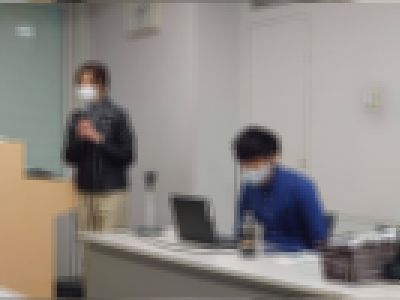::::::::::::::::::::::::::::::::::::::::::::::::::::::::::::::::::::::::::::::::
《今回のworkshop 》
○workshop参加人数:13名
○【前半】:Parkinson’s Law – Prevent you from improving productivity and quality
○【後半】:Changing trends in cannabis regulation
:::::::::::::::::::::::::::::::::::::::::::::::::::::::::::::::::::::::::::::::::
<Agenda>
Parkinson’s Law – Prevent you from improving productivity and quality

Improving productivity and quality should be considered as one of the vital factors for companies and individuals. You all know its importance, but I wonder how many people are conscious about that while working. Also, most of you have procrastinated on tasks or used the whole time until a deadline provided even if the tasks can be completed within a few minutes or a few hours. In that case, you might be doing your tasks influenced by “Parkinson’s Law”. “Parkinson’s Law” is the old adage that work expands to fill the time allotted for its completion.1) Let me give you an example. Looking back to when you are a child, you did your summer homework using all time or started doing it at the last minute even though the homework can be done for 1 week. That is unproductive for sure. On top of that, the principle can prevent you from missing opportunities to brush up tasks.
Through this discussion, I would like you to comprehend the concept of Parkinson’s law and think of how you can enhance productivity and quality by overcoming the principle.
<Question>
1. Do you usually procrastinate on your tasks or work on them at the last minute? Please share some experience you have or you have seen.
2. What are some of the things you pay attention to or put importance on when completing tasks or school assignments or allocating tasks to your colleagues?
3. What can be done to improve productivity and quality by overcoming Parkinson’s Law? Please share a few ways or ideas your group come up with.
<Reference>
1. What is Parkinson’s Law and why is it sabotaging your productivity? by Work life
2. 「パーキンソンの法則」をわかりやすく解説!「人が足りない」が嘘である理由 by 識学総研
≪LATTER HALF≫
<Agenda>
Changing trends in cannabis regulation

Current status and a brief history
Usage of cannabis also called as marijuana or weed has been strictly regulated in the world due to its addictive nature. Although it has been regarded as a harmful drug to public health for a long time, multiple counties are loosening their regulations in recent years. In addition, products containing compounds extracted from cannabis such as cannabidiol (CBD) are coming under the spotlight in the health and wellness industry expecting an improvement of mental health. Among the international society, Japan is one of the countries most strict against cannabis. However, Japanese started to use cannabis as a material for clothing and ropes far back in the Jomon-era and cannabis farming was widely implemented in Japan for a long time. The Japanese government started to regulate farming and usage of cannabis after World War II, reflecting the memorandum sent from GHQ aiming to clear ingredients and products related to addictive drugs away from Japan.
What is dangerous about “cannabis”
Cannabis usage is associated with an increased risk of heart, lung, and brain diseases and a decline in cognitive function. Raw cannabis contains more than 100 compounds (so-called “cannabinoids”) with different characteristics. Harmful compounds such as tetrahydrocannabinol (THC), may cause mood swings (“high”), reduce energy, and may negatively affect social activity performance in long-term use. On the other hand, compounds such as cannabidiol (CBD) are not impairing. The chemical separation technology has advanced to extract the individual compounds with high purity enabling the useful compounds to be safely used for medical purposes.
Re-evaluation of benefits of cannabis
The re-evaluation of medical benefits of cannabis started as “morphine”, the gold standard of the painkiller is not effective for neuropathic pain which 30% of cancer patients suffer from. Taking into consideration the fact, more than ten countries are allowing the use of cannabis or pharmaceuticals containing cannabis compounds for medical purposes. UN Commission on Narcotic Drugs (CND), the drug policy-making body of the United Nations (UN) contemplated for a long time as they regarded that scientific evidence was insufficient to conclude that the benefit outweighs the risk. However, they finally re-classified cannabis and cannabis resin under an international listing recognizing its medical value in 2020. In addition to treating pain, application to other symptoms such as anxiety, epilepsy, multiple sclerosis, sleep disorders, and post-traumatic stress disorder are under discussion.
Deregulation trend
Apart from medical cannabis, there is also a discussion on loosening the regulation to allow the usage of cannabis as “recreational drugs” to some extent. First of all, there is a question on whether the impact on public health is worth the current level of restriction compared to other addictive agents. A British study published in 2010 reported that alcohol and tobacco are more addictive than cannabis although they are more affordable. Secondly, current research could not conclude that the use of cannabis would be a gateway to harder substances such as heroin which was one of the reasons why cannabis was categorized in the same category as other opioids.
<Questions>
1. Many of you have the experience of traveling or living around the world. Different countries have different levels of restriction against cannabis. Did you ever come across people using cannabis? How did foreign people perceive cannabis? Please share your experience.
2. Japan is preparing to amend the “Cannabis control law” this year to permit the use of pharmaceuticals containing cannabis compounds for medical purposes. Should Japan also categorize cannabis as “recreational drugs” and establish a legally regulated market mimicking other countries such as Canada and Switzerland? Why or why not? If not, what would be the conditions to move forward?
3. Cannabis supporters claim that strict legalization is a violation of human rights. To what extent should personal freedom be respected?
*Supportive reading (https://www.theguardian.com/society/2021/jul/24/is-medical-cannabis-really-a-magic-bullet)
:::::::::::::::::::::::::::::::::::::::::::::::::::::::::::::::::::::::::::::::::
私たちと一緒に英語コミュニケーション能力を鍛えませんか?
ご興味を持たれた方は、
入会申込フォーム
https://english-speaking-club.com/cms/?page_id=93
よりお申し込みください。お待ちしています。
:::::::::::::::::::::::::::::::::::::::::::::::::::::::::::::::::::::::::::::::::